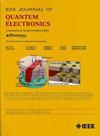基于接受场的全光脉冲神经网络图像处理
IF 2.2
3区 工程技术
Q3 ENGINEERING, ELECTRICAL & ELECTRONIC
引用次数: 0
摘要
我们报道了一种基于接受场(RF)的多层全光神经网络的新结构,该网络使用带有饱和吸收器(SA)的微柱激光器进行图像处理。从生物视觉的角度来看,基于射频的图像处理的实现为尖峰神经网络(SNN)实现的机器视觉提供了生物学合理性。通过利用SA激光的快速增益和吸收物理机制,实现了光子峰值时间相关的可塑性(STDP)曲线来训练权值。在这里,源图像像素被映射成脉冲序列的时间信息,通过时间到第一峰编码的时间编码方法注入到神经网络中。利用所提出的光子信噪比网络对不同的源图像进行了处理和测试。仿真结果表明,在STDP规则的调整下,该系统不仅可以处理简单的二值图像,还可以处理复杂的彩色图像。在鲁棒性方面,我们证明了图像分割对时间抖动的容忍度。这些结果表明,我们提出的光子SNN可以实现复杂源图像的高分辨率处理。此外,可以进一步采用时间复用技术来简化射频结构,这有望降低整个系统的复杂性,从而促进物理应用。我们的工作为图像处理的高速光子脉冲平台提供了前景。本文章由计算机程序翻译,如有差异,请以英文原文为准。
Receptive Field-Based All-Optical Spiking Neural Network for Image Processing
We report on a novel structure of a receptive field (RF)-based multi-layer all-optical neural network using a micropillar laser with a saturable absorber (SA) for image processing. From the perspective of biological vision, the realization of image processing based on the RF provides the biological rationality for the machine vision implemented by the spiking neural network (SNN). By exploiting the fast physical mechanisms of gain and absorption in the SA laser, the photonic spike-timing-dependent plasticity (STDP) curves are achieved to train the weights. Here, the source image pixels are mapped into the temporal information of spike trains injected into the neural network through the temporal coding method called time-to-first-spike encoding. Different source images are processed and tested by the proposed photonic SNN. Simulation results show that our proposed system can process not only simple binary images but also complex color images under the adjustment of STDP rules. When considering the robustness, we demonstrate the tolerance of the image segmentation to the time jitter. These results indicate that our proposed photonic SNN can achieve high-resolution processing of complex source images. Additionally, the time-multiplexing technique can be further adopted to simplify the RF structure, which is expected to reduce the complexity of the whole system, thus facilitating physical applications. Our work offers the prospect for a high-speed photonic spiking platform for image processing.
求助全文
通过发布文献求助,成功后即可免费获取论文全文。
去求助
来源期刊

IEEE Journal of Quantum Electronics
工程技术-工程:电子与电气
CiteScore
4.70
自引率
4.00%
发文量
99
审稿时长
3.0 months
期刊介绍:
The IEEE Journal of Quantum Electronics is dedicated to the publication of manuscripts reporting novel experimental or theoretical results in the broad field of the science and technology of quantum electronics. The Journal comprises original contributions, both regular papers and letters, describing significant advances in the understanding of quantum electronics phenomena or the demonstration of new devices, systems, or applications. Manuscripts reporting new developments in systems and applications must emphasize quantum electronics principles or devices. The scope of JQE encompasses the generation, propagation, detection, and application of coherent electromagnetic radiation having wavelengths below one millimeter (i.e., in the submillimeter, infrared, visible, ultraviolet, etc., regions). Whether the focus of a manuscript is a quantum-electronic device or phenomenon, the critical factor in the editorial review of a manuscript is the potential impact of the results presented on continuing research in the field or on advancing the technological base of quantum electronics.
 求助内容:
求助内容: 应助结果提醒方式:
应助结果提醒方式:


